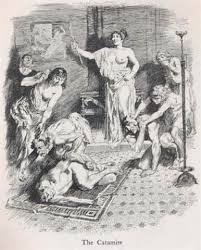(Chris' introductory slide features the Norman Lindsay's "The Catamite" [1922])

Maurice felt uneasy.
"Then you understand-without me saying more-"
"How do you mean?"
Durham could not wait. People were all around them, but with eyes that had gone intensely blue he whispered, "I love you"
Helen Morales (2008) also concerned with (homo)sexuality in Petronius: "It stages a plurality of pleasures (and more often pains), but is far from a celebration of male sexuality.








